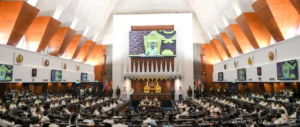The past several days of political manoeuvring prompted the resignation of the Prime Minister of Malaysia, Tun Dr. Mahathir Mohamad. He was then re-appointed as Interim Prime Minister on the same day by the Yang di-Pertuan Agong (YDPA), pending the appointment of a new Prime Minister in accordance with the Federal Constitution.
Article 43(2)(a) of the Federal Constitution states that the YDPA shall appoint as Prime Minister “a member of the House of Representatives who in his judgment is likely to command the confidence of the majority of the members of that House.”
For now, the only likely candidate to command the confidence of the majority is Mahathir himself.
Meanwhile, the YDPA also revoked the appointments of all Ministers on the advice of the Prime Minister. This is provided for by Article 43(5) of the Constitution.
These developments have plunged the country into unprecedented political contestation and uncertainty. The people are yet again left grasping at straws.
I seek to address two questions below.
What happens when a Prime Minister resigns?
There are different scenarios depending on the reasons why Mahathir resigned.
On the one hand, if Mahathir had resigned because he no longer enjoyed the confidence of the majority, according to Article 43(4), the entire Cabinet would have to resign with him.
He would then have the option of asking the YDPA to dissolve the Parliament.
Should he choose not to do so, the leader of the largest party in Parliament who can command the confidence of the majority may form the new government.
In the event that said leader cannot get the necessary support to form the government, then it is open for others to do so.
Finally, if no one can command the confidence of the majority to be the Prime Minister, then the YDPA has the residual discretion to dissolve Parliament and call for fresh elections.
On the other hand, if Mahathir had resigned because he did not want to be the Prime Minister anymore, he would have to nominate a successor. The successor would need to prove to the YDPA that he enjoys the confidence of the majority. This would allow him to be appointed as the new Prime Minister.
Mahathir would remain as the Prime Minister until the successor is appointed.
If the chosen successor does not enjoy the confidence of the majority, then the political parties may negotiate among themselves on who will take over to form the new government.
Nevertheless, the opposition parties should not be allowed to propose a new Prime Minister and form a new government without going through fresh elections. This is because they campaigned on coalitional platforms, not party platforms. Allowing the opposition parties to become the government goes against the fundamental principles of democracy whereby an elected government should be a representation of the will of the people.
Going back to Mahathir, it is clear that he did not resign due to a loss of confidence in him as the head of government. Since his resignation, he has received pledges of support from all sides of the political divide.
Yet, he has not named a successor either. All attempts to elicit a succession plan from Mahathir have been met with vague and dismissive responses, and he is now Interim Prime Minister. This leads us to the second question.
Is Mahathir the 8th Prime Minister of Malaysia?
In countries that adopt the Westminster parliamentary system, it is not uncommon for the Members of Parliament to move a motion of no confidence against a sitting Prime Minister.
What is uncommon is this situation that Malaysia is currently in, where the government and opposition coalitions are jostling to express their confidence in the same man (the list has allegedly expanded to include several others at the time of writing, but the information has not been verified).
This essentially places power in the hands of one man instead of in the hands of the people, which a parliamentary democracy aims to do. This puts the country in an awkward position.
If there is no clear successor and the opposition cannot command a simple majority in Parliament, then the status quo remains, with small but significant differences from before.
Mahathir is still the seventh Prime Minister. The Interim Prime Minister is a political term rather than a legal term. In fact, it has been used to describe Mahathir’s position since the 14th General Elections.
Mahathir can remain in his role as the seventh Prime Minister for as long as he wants to without any transition date, or until someone proves to the YDPA that Mahathir no longer commands the confidence of the majority.
Mahathir fired his whole Cabinet because he can do so as the Prime Minister, under Article 43(5) of the Federal Constitution.
Mahathir is not part of any political party or coalition anymore. Therefore, he is not bound by their rules, policies, decisions, and manifesto.
Mahathir can choose to align with anyone he wishes to. The Malaysian Government is currently a one-man government, if it wasn’t already one previously.
Mahathir is now…King of the Andals and the Rhoynar, and the First Men, Lord of the Seven Kingdoms, and Protector of the Realm.




